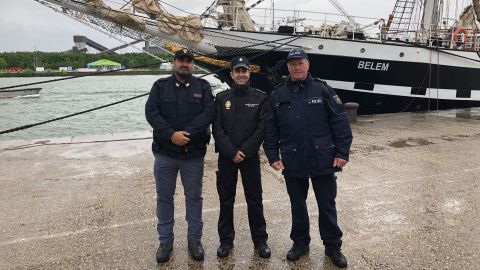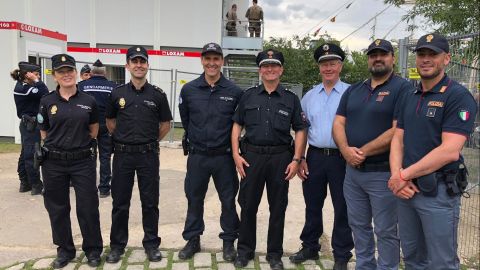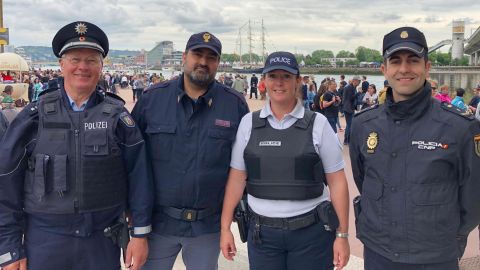The Armada in Rouen
Rouen is a port city on the Seine and the capital of the northern French region of Normandy. Around 110,000 inhabitants live in the city, where Joan of Arc (the "Maid of Orléans") was burned to death in 1431. The distance to the North Sea Channel is approx. 90 km.
The "ARMADA" is an event that the city of Rouen has been organizing every four to five years for the past 30 years. Mostly tall ships, but also other large vessels from many countries dock on both sides of the Seine, from where they can be viewed by visitors.
50 ships from 30 different countries, such as Mexico, Brazil, Russia, the Netherlands and many others were available for visitors to view on and below deck. Up to eight million visitors were expected. Due to the terrorist attacks in many places in the past, barriers were erected and checkpoints set up for the first time at this event.
Arrival and first briefing
On June 5, 2019, I arrived at the "Hotel de Ville" in Rouen, where I was met by the commander Bruno Roussel. He told me that another German, two Italian and two Spanish police officers were expected, but that some of them would not be arriving until the next day.
The duty times were scheduled from 9am to 5:30pm and from 2pm to 10:30pm, with one officer from Italy, Spain and Germany on duty for each of these shifts. The changes were always to be made by arrangement from early to late to early shift, etc.
As a welcome gift, I was given maps of the city and the deployment area, as well as an umbrella, which should have given me something to think about. I was then shown my changing room and the breakfast room. I then attended a briefing for the French foreign forces. The police chief and the director of the department pointed out the risks of an attack and a demonstration by the "yellow vests" planned for Saturday, which could lead to riots.
After the meeting, we picked up our German colleague from Hanover at the train station and drove to his accommodation - a student residence.
Operation sequence
The officers of the guard operation and those of the "Armada" special operation always met at the "Hotel de Police" at the start of the operation. We received our weapons there and were taken to the operations room about two kilometers away.
On the first day, we set up a police outpost in the shopping center building near the Armada so that we could get to the operations room quickly from there. Then I went on patrol with my French colleagues. The first ten ships had already arrived and the number of visitors was still manageable.
Over the course of the second day, an Italian and a Spanish colleague joined us. It was very interesting to be able to talk to colleagues from other countries in French. The two in my group came from Rome and Madrid.
Our main task was to patrol the Armada's operational area. For security reasons, all officers had to show their ID badges at the entry checkpoints, despite being in uniform and carrying a firearm, but this became easier as the days went by because the security staff checking us already knew us. During each shift, we patrolled 15 - 20 kilometers on both sides of the Seine in the approximately 7.5-kilometer-long operational area. Due to the constantly changing weather conditions in Normandy, it was difficult to find suitable uniforms. The French forces were instructed not to wear the yellow rain jackets in order to avoid confusion with the "yellow vests" if they tried to enter the operation area. Although there were violent riots in the south of France (Montpellier) on June 8, things remained calm in Rouen.
One evening, the event was shut down for safety reasons in winds of over 100 km/h. We were now responsible for clearing the area. However, the visitors on site followed our instructions without any problems. We also frequently cleared parts of the banks of the Seine, for example when ladders were attached to the boats. In one case, we had to hand over a very drunk sailor to his crew. A French colleague told us that there had been incidents in the past where drunken visitors or ship personnel had fallen into the Seine.
We gave a Breton music group free passage across the site and found a missing eight-year-old child, who we were able to hand over to her mother unharmed. In addition to the French, we also met a relatively large number of German, Italian and Spanish visitors who were enthusiastic about the deployment of a "European police force". Many visitors asked if they could take photos of us or if it was possible to take a photo together, which we usually agreed to. During the operation, I was also frequently asked why no German ship was present at the Armada.
In another case, a German-speaking Dutch sailor who had his bag containing important documents stolen at a party came to our branch office and was referred to the police station by means of my translation. I also explained to him that he was certainly not allowed to view video recordings from the camera for data protection reasons, as he had previously assumed that this was the case.
During a patrol, we went to the Armada journalists' office. In addition to an open-plan office with around 30 computers, there were another 50 or so small offices from which a lot of the event was being reported on by the media.
On the last day of the operation, we were able to work together with our "foreign colleagues" from the other group. The large ships departed again between 10 am and 6 pm. The "Gustav-Flaubert" bridge was mechanically raised so that the ships with their meter-high masts could pass underneath. This took place to great applause from the audience and the ships' signal tones.
Afterwards, we were given a fitting send-off by the Chief of Police and Police Councillor Legrand, who thanked us for our efforts and expressed their satisfaction with the success of the operation. According to the police, there was talk of around four million visitors.
Conclusion
After my assignments in Marseille during the 2016 European Football Championships and with the gendarmerie on the Ile-de-Ré in 2018 during the peak tourist season, I was once again able to take part in an assignment in another European country. With joint missions of this kind, this mutual interest in each other and the enormous support from the population of various countries, the path towards a European police force is growing and I am once again grateful that I was able to be part of this development.


